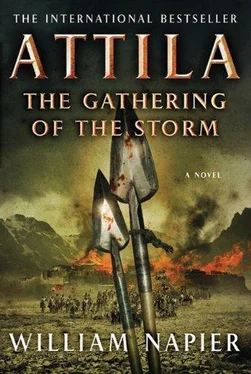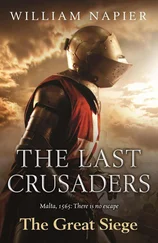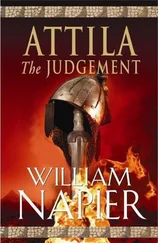William Napier - The Gathering of the Storm
Здесь есть возможность читать онлайн «William Napier - The Gathering of the Storm» весь текст электронной книги совершенно бесплатно (целиком полную версию без сокращений). В некоторых случаях можно слушать аудио, скачать через торрент в формате fb2 и присутствует краткое содержание. Жанр: Исторические приключения, на английском языке. Описание произведения, (предисловие) а так же отзывы посетителей доступны на портале библиотеки ЛибКат.
- Название:The Gathering of the Storm
- Автор:
- Жанр:
- Год:неизвестен
- ISBN:нет данных
- Рейтинг книги:3 / 5. Голосов: 1
-
Избранное:Добавить в избранное
- Отзывы:
-
Ваша оценка:
- 60
- 1
- 2
- 3
- 4
- 5
The Gathering of the Storm: краткое содержание, описание и аннотация
Предлагаем к чтению аннотацию, описание, краткое содержание или предисловие (зависит от того, что написал сам автор книги «The Gathering of the Storm»). Если вы не нашли необходимую информацию о книге — напишите в комментариях, мы постараемся отыскать её.
The Gathering of the Storm — читать онлайн бесплатно полную книгу (весь текст) целиком
Ниже представлен текст книги, разбитый по страницам. Система сохранения места последней прочитанной страницы, позволяет с удобством читать онлайн бесплатно книгу «The Gathering of the Storm», без необходимости каждый раз заново искать на чём Вы остановились. Поставьте закладку, и сможете в любой момент перейти на страницу, на которой закончили чтение.
Интервал:
Закладка:
A manmade inlet alongside was clogged with the dark shapes of logs, felled and rolled down far to the north. For the forests of Scythia were limitless, while already the oak woods and chestnut woods, the cypress woods and cedar woods in the mountains of Greece and Cappadocia were growing bare. But such trading-stations as this dealt most profitably of all in rich furs, in the late winter and spring, when pelts were at their thickest: the dark of mink, the russet of sable, marten, beaver. From the mountains to the east came goatcombs of cashmere, straw-pale and greasy to the touch, for the mills of the empire, to be made into the finest robes for the lords and ladies of Byzantium. And from the north, down the great Scythian rivers, came long, shallow-drafted boats with whorled prows, crewed by blue-eyed, bearded northmen, carrying casks of precious Baltic amber.
A little trading-post such as this, on the very edge of the empire, where the last homely lights finally gave way to the endless dark of the barbarian plains, might seem vulnerable to attack. But there had been a generation of peace now, and many of the tribes were foederati, allies or even paid auxiliaries of the Emperor of the East in Constantinople. The little torchlit town lay calmly beside the wide, slow river.
Attila hazed his men backward off the rise until they could just see the road but were themselves hidden.
‘Is there no garrison in the town?’ whispered Orestes.
Attila’s gaze remained fixed on the little outpost of empire below. ‘Probably.’
It was almost dark, and some of the men would have been asleep in their saddles were it not for fear of their lord, when from the shadows of the town emerged a longer column. There were perhaps half a dozen mounted men, and then a painted carriage, with a further dozen or so men, women and children on foot behind. From the way they walked, a slow shuffle with shoulders bowed, it was clear that some if not all were manacled. But it was too dark to see clearly. The only colours were the cloudy blue and grey of twilight, the only lights the flickering of torches at the gates of the town and the flash of the troopers’ spearheads as they moved like leaves in the wind and caught the first moonlight.
Attila gave no word, no signal. He heeled his horse forward and rode down the slope towards the road. His men, their bellies cold with fear at this attack, held their horses back and waited unseen behind the rise, watching him go, the only sound the swish of his horse’s legs through the tall, dry feathergrass.
One of the mounted troopers saw him approaching in the half-light and called a halt, but without alarm. They turned and held their spears ready.
Attila rode forward.
‘Halt there!’ called one of the troopers, pulling round and riding over to him; evidently their lieutenant. Attila ignored him but made towards the carriage.
At the sound of the lieutenant’s command, the drapes of the carriage twitched back and a face peered out. The well-fed city face of a Greek merchant. He almost yelped when, only feet away, he saw a mounted barbarian with knotted hair, wearing only breeches of cross-gartered deerskin, his silhouette in the darkness spiky with weapons.
The barbarian addressed him: ‘Linguam loquerisne latinam?’
The merchant, Zosimus by name, stammered that of course he spoke Latin. But he was surprised that…?
The merchant could hardly believe his ears. A polyglot barbarian, a savage bare to the waist but for his gold earrings and his horrible tattoos of midnight blue, his silver armlets banded tight around biceps as hard as stone. This fierce-eyed creature without knowledge of the law, of letters or any of the other appurtenances of civilised life, addressing him out of the Scythian darkness first in the language of Cicero, then in that of Demosthenes – for all the world as if he had been raised by the finest grammarians and rhetors in the empire, rather than by some bejewelled barbarian woman in a felt tent stinking of leather and sweat and horse-dung fires!
The lieutenant came alongside the barbarian and shook him roughly by the shoulder.
‘Back off, Top-Knot,’ he growled. ‘This column is on imperial business, and it’ll be the worse for you if-’ repeated the barbarian, neither raising his voice nor shifting his gaze from the astonished merchant.
‘And Greek, too, naturally,’ blurted Zosimus. ‘But I fail to see why I should bandy words with a malodorous painted savage such as yourself. Now do as this good man suggests and-’
Attila glanced back over his shoulder at his four companions, now only some twenty or thirty yards away in the dusk. Now he used the language of his people.
‘Kill the soldiers,’ he called.
And they came galloping over the rise.
He himself did not stir as the arrows flew around him. His horse whinnied and stepped delicately backwards as one of the humming arrows grazed just over its nose, but its rider sat as comfortably as if he were watching a mere game. It was all over in a matter of seconds. One trooper rested gently in his saddle with an arrow through his heart, his head drooping forwards like a flower in autumn. The others toppled sideways or lay dead in the dust beside their horses’ hooves. Attila walked his horse among the dead and counted. Then he turned to his men, milling around close by.
‘Six men with sixteen arrows,’ he said. ‘A reasonable performance. ’
Then he saw a horse standing trembling with an arrow buried deep in its withers. Its forelegs seemed about to buckle but it gave a great heave of its ribcage, blood frothing from its nostrils, and remained standing.
‘Which one of you shot the horse?’
After a moment’s hesitation, Yesukai raised his fist.
Attila rode over to the young warrior and put his face very close to his.
‘Don’t – do – that – again,’ he said, his eyes burning.
Yesukai could not speak.
Attila rode back and pulled up before the wounded horse and drew his chekan, his short spike-hatchet. He pushed himself forward on his saddle, swung hard, and buried the long iron spike deep in the horse’s forehead, just above the eyes. As the priests would sacrifice the finest horses for a royal burial. He pulled the hatchet free and the horse collapsed and lay dead in the dust.
He gave orders for the other five cavalry horses to be taken, then rode back to the carriage and looked in at the cowering merchant. There were two other men in there with him.
One of them, with a petrified, thin-lipped smile, quavered, ‘My lord, I… I… These two, they are merchants, but I am a lawyer.’
‘A lawyer?’ said Attila, staring at him.
‘Indeed, yes.’ The smile grew sickly. ‘With connections in the highest courts in the empire.’
‘I hate lawyers.’
A knife appeared in his hand, and he reached from his horse and drew the blade across the lawyer’s long, lean throat. The man’s head fell forwards instantly upon his sodden chest.
The two merchants were dragged shrieking from the carriage and gagged and trussed up and sat on two of the captured horses, and they turned away westwards for home as the darkness deepened around them. At the last moment, Attila turned back and eyed the dozen or so silent, horror-struck men and women and children in their chains behind the carriage. None of them had moved amid the carnage.
Attila said to them, ‘I once knew a boy and a girl who were runaway slaves.’ He looked down at each of them in turn. ‘The girl was not seven summers, and she died. Her name was Pelagia. A Greek girl. But even she had more fight in her than you.’ His horse tossed its head, teeth bared, as if in contemptuous agreement. ‘Free yourselves,’ he said to them.
And he left them there, their armed guards slain but themselves still manacled, standing with mouths agape on the darkening road.
Читать дальшеИнтервал:
Закладка:
Похожие книги на «The Gathering of the Storm»
Представляем Вашему вниманию похожие книги на «The Gathering of the Storm» списком для выбора. Мы отобрали схожую по названию и смыслу литературу в надежде предоставить читателям больше вариантов отыскать новые, интересные, ещё непрочитанные произведения.
Обсуждение, отзывы о книге «The Gathering of the Storm» и просто собственные мнения читателей. Оставьте ваши комментарии, напишите, что Вы думаете о произведении, его смысле или главных героях. Укажите что конкретно понравилось, а что нет, и почему Вы так считаете.












